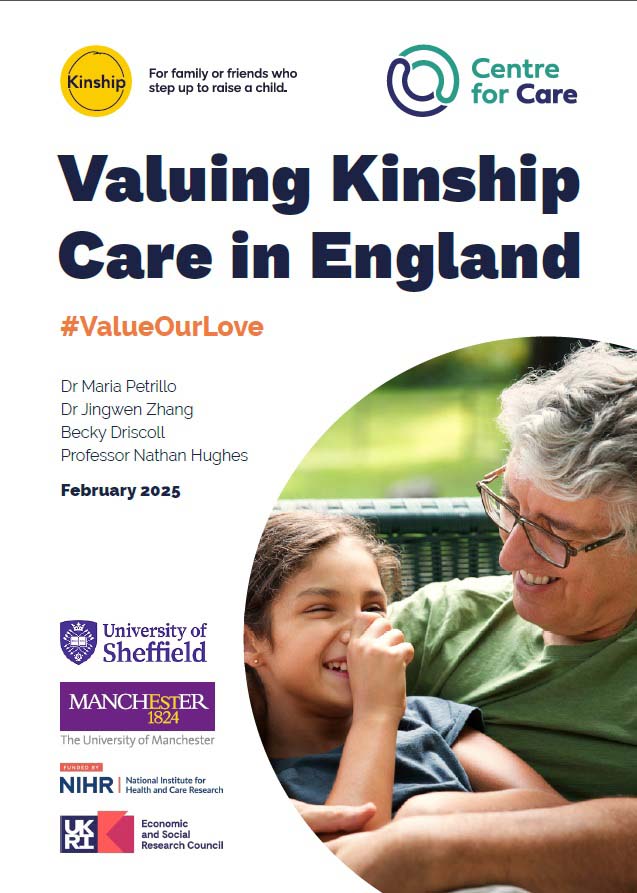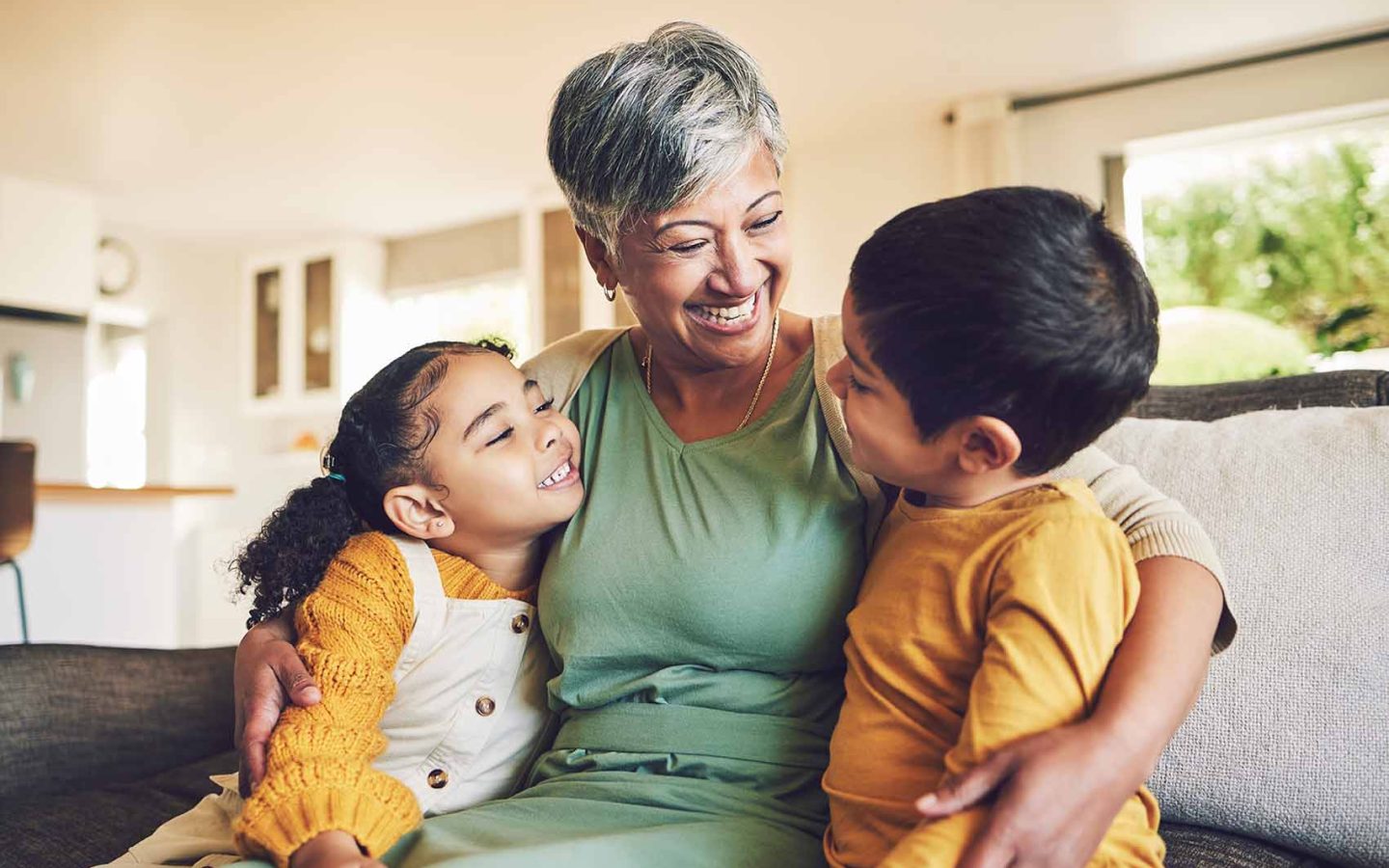New report by the Centre for Care in partnership with Kinship
- New research from the Centre for Care, based at the University of Sheffield, together with the charity Kinship and the University of Manchester, estimates kinship carers contribute £4.3 billion a year to society
- Data from the new report estimates there are over 132,000 children living in kinship care arrangements in England, many of whom would otherwise be in the care system
- Unlike foster carers, most kinship carers do not receive financial support from the government
- Charity Kinship says as many as 1 in 8 kinship carers are facing the real possibility that they will be unable to continue to care for a child due, often due to a lack of financial support
- The new research underpins Kinship’s #ValueOurLove campaign, which is calling on the UK government to equalise support between kinship families, and foster and adoptive families
Kinship carers in England are contributing more than £4.3 billion a year to the economy by raising children – many of whom would otherwise be in the foster care system – new research from the Centre for Care, hosted by the University of Sheffield, and Kinship, the leading kinship care charity, has found.
The report ‘Valuing Kinship Care in England’ released today (12 February 2025), makes clear that despite the high value of care provided by families and friends, most don’t have access to the same financial, practical and emotional support that is available for foster carers.
Over 132,000 children are estimated to live in kinship care in England, over twice the number of children estimated to be looked after in foster care; demonstrating the scale of the contribution made by kinship carers in ensuring that many of these children do not enter state care.

Kinship carers are grandparents, aunts, uncles, older siblings, other family members or close family friends who step up to raise a child whose parents are unable to continue to do so. Evidence shows that kinship care provides better long term outcomes and a safe and stable home for children and young people who are likely to have experienced significant early life adversity, like loss, trauma, or neglect.
In Yorkshire and Humber alone, there are estimated to be 16,087 in kinship care, the value of which to the region is over £440 million a year. Of those children, 1,538 are found in Sheffield, and the families and friends providing that kinship care contribute £50 million to society every year.
Kinship care is an invisible but vitally important pillar of the children’s social care system.
Our research estimates kinship care is worth £4.3 billion a year to the government, which is the equivalent to nearly 40 per cent of the entire children’s services budget for England. If this care was no longer available, our child protection and welfare systems would simply not be able to cope with the rise in demand for children requiring alternative forms of care, most commonly foster care, which costs taxpayers millions each year.
Kinship carers provide crucial support, usually without receiving any funding from the government, or the extensive practical and emotional support available for those who provide other forms of care for children. We cannot continue to take kinship carers for granted, or simply see their care as a cheap option.
Professor Nathan Hughes, Deputy Director, Centre for Care
Previous research by Kinship also found that as many as 1 in 8 kinship carers are facing the real possibility that they will be unable to continue to care for a child, often due to being unable to afford the cost of caring for a child. This would come with devastating consequences for children, families and the public purse.
The new report from the ESRC funded Centre for Care and its collaborators at the University of Manchester is underpinning Kinship’s #ValueOurLove campaign, which is calling on the Chancellor Rachel Reeves to equalise support between kinship families, and foster and adoptive families. It recommends that the government invests in financial support for kinship carers, as well as ensuring that robust and accurate data is collected about kinship care to best identify where help is needed.
Doreen, 69, from Leeds and a mother of three has a Special Guardianship Order to care for her grandson. She does not receive a financial allowance to help her to support him, instead she relies on her pension credit, child benefit and bereavement allowance.
The social worker said that I didn’t need financial support, but it didn’t sink in at the time because my priority was getting custody of my grandson to keep him out of the care system.
Now I live in my overdraft each month. I am struggling to make ends meet. I buy own label and reduced priced food and I worry about the bills. This winter we’ll have the heating on for an hour in the morning and evening and wrap up in PJs and a hoodie to stay warm.
I will save up to get my grandson things he needs and wants as he is my number one priority. We haven’t had a holiday in five years. I feel terrible that his friends go away abroad but I just can’t afford it.
I attend a peer support group which really helps, as you don’t feel so alone. When we get together we get the chance to share problems and advice, so it’s really helpful and it’s good to have that social side of things as it can be lonely being a kinship carer.
Janet, 69, and her husband Peter, 71, have raised their 12-year-old grandson since he was 18 months old as his parents weren’t able to look after him.
The Sheffield couple have a Child Arrangements Order but have never received any financial, therapeutic or emotional support from social services to help them care for their grandson. Janet says their grandson also has learning difficulties (ADHD), yet they cannot get any support for his educational or emotional needs from their local authority.
I was 58 when my grandson came to live with us. He was 18 months old, and I still had two of my adopted children living in the house. I was the breadwinner but I needed to be at home with him. My work, which I loved, said there was no way I could go part-time. So I left my job to care for my grandson. I lost both income and some of my pension by leaving suddenly like that, but I had no choice. I got no financial support whatsoever. We’ve been raising him on our pensions ever since.
I lead support groups for kinship carers and I see the impact it’s having on different kinship families in my area. Some of the kinship families I know are just not managing.
Shoes are so expensive. Food. Activities. I don’t know why they think children in kinship care cost less than children in foster care. They don’t! And these children would be in care otherwise, and care costs an absolute fortune – especially children’s homes.
What kinship carers contribute is enormous and these children are being loved by people who know them already, and are getting all the stability and permanence they need to thrive. It just makes sense to support them properly. That is why I have been campaigning nationally for financial support for all kinship carers, through the charity Kinship’s #ValueOurLove campaign, as well as campaigning locally. In Sheffield, there is starting to be real progress with commitments to get kinship carers the support they need.
Following the publication of ‘Valuing Kinship Care in England’, and together with Kinship, the researchers are calling on Chancellor Rachel Reeves to bring much-needed funding to the table for kinship carers in England as part of the government’s Spending Review concluding in June this year. The government has committed to trialling a new kinship allowance in up to ten local authorities, but Kinship now wants to see these plans accelerated and a commitment made to guarantee financial allowances for all kinship families across the country.
Our research underpins calls to invest in support for kinship carers, who are more likely than other UK adults to be living in poverty and to experience deprivation in terms of employment, education and housing.
Despite this, evidence shows that the existing family ties and connections of kinship care contribute to better long term outcomes and wellbeing for children. By investing just a fraction of the £4.3 billion contribution by kinship carers into financial allowances and cost-of-living support for low-income families, the government would dramatically improve outcomes for many children.
Becky Driscoll, Centre for Care
Kinship carers contribute billions to the economy, and yet most are left unsupported by the government. It is a disgrace that kinship carers are plunged into poverty; when other carers such as foster carers receive financial support, kinship carers are lying awake at night worrying about finding money to feed children they didn’t know they would be raising.
It’s time for the Treasury to take notice of the commitment and collective sacrifices kinship carers make to raise children against all odds, so that they can keep them in a family home and out of the care system. They must deliver the urgent support needed by choosing to invest in kinship care as part of the forthcoming Spending Review to guarantee a financial allowance for every kinship family in England.
Dr Lucy Peake, CEO of Kinship
